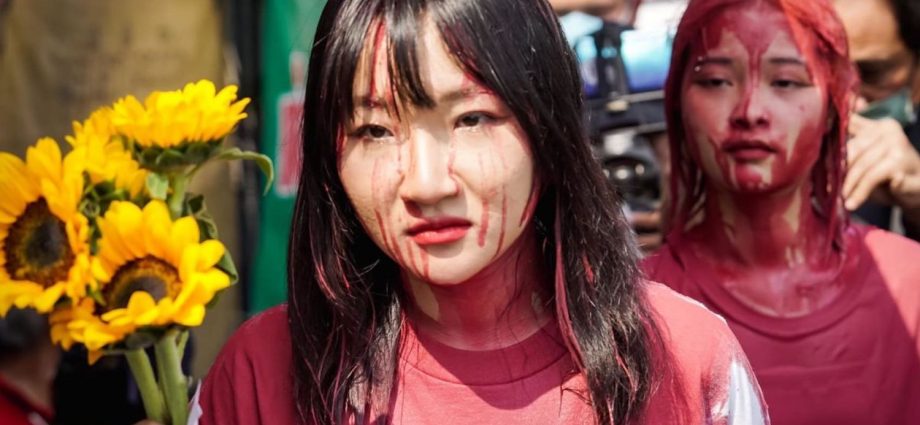As Bangkok crowd calls for repeal of lese majeste law, Chiang Rai man sentenced to 28 years

Hundreds of people staged a candlelight vigil in central Bangkok on Thursday evening in support of two hunger striking political activists whose health is deteriorating fast.
Six opposition parties also released a joint statement calling for authorities to seek views from all parties concerned about judicial reform, and for the bail rights of defendants in political cases to be considered fairly by the courts.
The developments came on a day when the Criminal Court once more rejected bail applications from detainees currently awaiting trial on royal defamation and other charges related to anti-government protests.
Tantawan Tuatulanon and Orawan Phuphong, who are also facing lese majeste charges, have been on a hunger strike since Jan 18 to demand the release of all political prisoners.
The two young women, who are refusing food as well as water and medical intervention, are also calling for the abolition of the lese majeste and sedition laws.
The pair are at Thammasat University Hospital, where they can no longer move without support, according to an update from Thai Lawyers for Human Rights (TLHR). Ms Tantawan has swollen lymph nodes and both women have severe stomach pain, for which they agreed to take antacids. Severe abdominal pain is making it difficult to sleep, said a lawyer who visited them. Their potassium levels are low, and they risk cardiac arrest.
Outside the Bangkok Art and Culture Centre, where supporters of the hunger strikers have been rallying for several days, the crowd on Thursday night chanted “Abolish the lese majeste law!” A handful of activists dressed in prison garb poured red liquid over themselves, recalling a gesture by Ms Tantawan and Ms Orawan who had poured red paint on themselves at an earlier demonstration.
In Chiang Rai, meanwhile, a court sentenced a man to 28 years in prison for insulting the monarchy in online posts, his lawyer said on Thursday.
Mongkol Tirakote, 29, an online clothing vendor and activist, was found guilty in two separate royal defamation cases under Section 112 of the Criminal Code.
His prison sentence was originally 42 years but the court reduced it following his testimony, his lawyer told AFP.
The lawyer said Mongkol intended to lodge an appeal and the court granted him bail of 300,000 baht.
Royal defamation convictions can carry a jail sentence of up to 15 years per charge.
Mongkol also faces a third, separate charge over online posts from last year and will be back in court in March.
Sunai Phasuk, a senior researcher with Human Rights Watch, said the 28-year sentence was the second-highest prison term handed down by a Thai court for a royal defamation case.
In 2021, a court handed down a record 43-year sentence to a woman identified only as Anchan for insulting the monarchy. Her sentence was originally 87 years and she remains in prison.
Ostensibly meant to shield the royal family from defamation, insults or threats, Section 112 is broadly interpreted to include any criticism of the monarchy.
Anyone can file a complaint with police and they are obliged to investigate it. As a result, critics say, the law is frequently used to intimidate people with different political views.
There was a decline in charges for several years but mass youth-led protests in 2020 calling for democratic change and reforms to the monarchy resulted in the use of the law being revived.
More than 200 cases have been brought against pro-democracy activists since November 2020, according to TLHR.
The group says 16 people are now being held in detention pending trial or appeal on charges related to their participation in the pro-democracy movement, eight of them on royal defamation charges.

